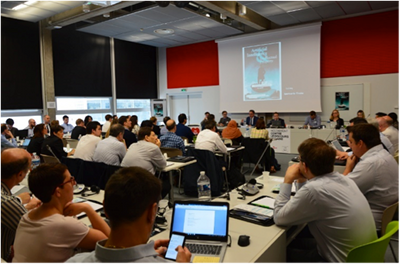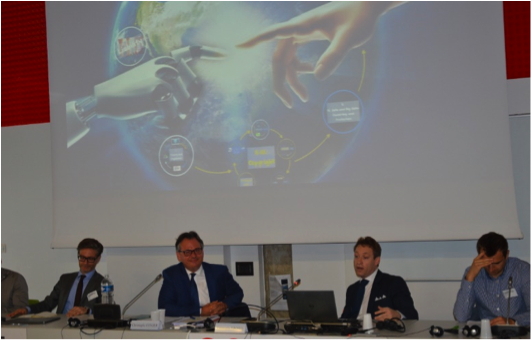EPO Conference: “Patenting Artificial Intelligence – Current Practice and Challenges” now available online
This event was the first conference on patenting AI technologies held at one of the major patent offices for China, Japan, South Korea, and the USA. The current topic attracted more than 350 participants from industry, academia, user associations, patent law firms, the judiciary, national patent offices, and government bodies from Europe, America, Asia, and Africa. The conference was an unprecedented opportunity to openly exchange views and raise awareness for issues relating to strategies for protecting innovations based on AI technology.
As far as innovation for the benefit of society is concerned, there should be as much incentive as possible for innovators to disclose AI innovations – such as the algorithms and how they were trained – instead of choosing the option of keeping trade secrets. The patent filing statistics showed that, in AI-related fields of technology, applications claimed a technical effect for algorithms, which was in line with the requirements laid down in the case law of the EPO Boards of Appeal for patenting mathematical methods.
The event provided a unique opportunity for open exchanges of views and for raising awareness for:
- issues relating to strategies for protecting AI innovations
- the challenges in drafting and prosecuting patent applications for AI inventions
- possible future considerations for patent law
The program consisted of lectures and panel discussions followed by Q&A sessions.
File download: Recordings of the event
If you would like to learn more about the topics addressed during the event, please take a look at the conference program and check out the summary of the event below.
The conference was the first event held by a major patent office which was designed to encourage an open discussion of the impact of artificial intelligence (AI) on the patent system. It attracted over 350 representatives of industry, academia, user associations, patent law firms, the judiciary, national patent offices, and government bodies from Europe, America, Asia, and Africa. The event provided a unique opportunity to discuss the challenges involved in drafting and prosecuting patent applications for AI inventions.
Possible future considerations for patent law
The program consisted of lectures and panel discussions followed by Q&A sessions. This document summarizes the presentations and discussions, thus reproducing the ideas and opinions of the various speakers. They do not necessarily represent the views of the EPO.
For more details on the content of the conference, you can watch the recordings. For more information about the speakers, please see the conference brochure, which also contains the program.
Artificial intelligence is making its way from universities and laboratories of computer science departments into companies, business models, and the everyday lives of consumers. The market for AI-based technologies is set to grow from US$ 8 bn in 2016 to an estimated US$ 47 bn in 2020. As recently as in 2017, AI technologies saw a 300% increase in investment activities. There are a number of regulatory and strategic implications associated with AI-based technologies, which were discussed during a dedicated CEIPI [LINK] seminar in Strasbourg from May 24-26. The seminar was about the theoretical, historical, and market environments giving rise to the regulation of artificial intelligence (AI), machine learning (ML), and robots. Special emphasis was placed on machine-generated or computational creativity during the seminar. The disruptive effects of AI on traditional business models will require a rethink of the intellectual property (IP) framework and strategies. Against this backdrop, this seminar presented legal tools available to protect AI, including trade secrets, copyright, and patent protection. Another point on the agenda was an introduction to the efforts made in the normative landscapes of multiple jurisdictions, which could potentially be the start of a ground-breaking revolution. The seminar also touched on how alternative approaches to computational creativity regulation will have far-reaching commercial implications, shifting incentives for developing AI.

There was a dedicated module on novel issues emerging in connection with AI and data management. The processing of data and big data is indeed a fundamental part of machine learning. Data ownership might emerge as critical issue to be carefully considered when dealing with AI and ML systems. Developing AI and ML systems generally involves training these systems using large datasets, so they can continuously improve their decision-making abilities. But who owns the IP in the datasets used to train the system? Although data might be freely available online, it cannot be used for all purposes. Therefore, genuine issues of liability for the use of proprietary data in ML processes might arise. On the other hand, data protection regulation will play an important role in the evolution of AI and ML systems. Another key focus of the seminar was therefore on relevant legislation and case law, with particular emphasis on the interpretation of the provisions of the upcoming EU General Data Protection Regulation on profiling and automated decision-making.
 Finally, the patent strategy module, held by Jean-Marc Deltorn, patent examiner at the European Patent Office, EPO, looked at the vast array of issues related to patenting AI and ML (machine learning) systems. In this context, international legislation, case law, and the practices of patent offices were discussed during this module, with special emphasis on EU-US comparative analysis. A fundamental challenge for protecting AI technologies is to develop claims with a patentable subject matter. Another important issue this module looked at was how to identify the inventive step in developing AI-related patents. Furthermore, satisfying disclosure requirements can be challenging when seeking patent protection for AI-based inventions. What should be disclosed in AI inventions to meet the requirements? Again, how should an AI-based invention claim be drafted? How does the doctrine of equivalents apply to AI inventions? Do different standards apply to rule-based systems and neural networks? These were some of the highly relevant questions for IP strategy makers that were discussed during the seminar.
Finally, the patent strategy module, held by Jean-Marc Deltorn, patent examiner at the European Patent Office, EPO, looked at the vast array of issues related to patenting AI and ML (machine learning) systems. In this context, international legislation, case law, and the practices of patent offices were discussed during this module, with special emphasis on EU-US comparative analysis. A fundamental challenge for protecting AI technologies is to develop claims with a patentable subject matter. Another important issue this module looked at was how to identify the inventive step in developing AI-related patents. Furthermore, satisfying disclosure requirements can be challenging when seeking patent protection for AI-based inventions. What should be disclosed in AI inventions to meet the requirements? Again, how should an AI-based invention claim be drafted? How does the doctrine of equivalents apply to AI inventions? Do different standards apply to rule-based systems and neural networks? These were some of the highly relevant questions for IP strategy makers that were discussed during the seminar.
Download the full program here.



